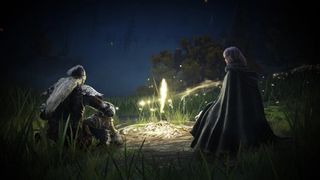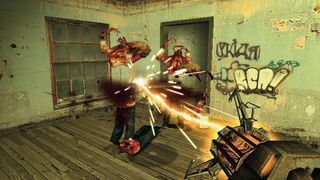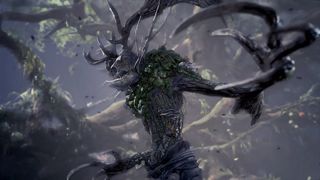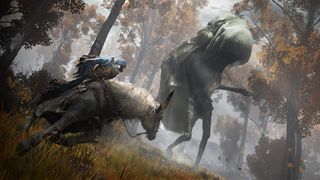Witches, physicists, Tarot readers, game designers, and amateur botanists weigh in on how magic is portrayed in video games
Interview | Play Magazine talks magic with the professionals to see what it means to them, in real life and in game systems

When you know how it all works, it's still magical. For scientist and author Felix Flicker, magic is that which is "hidden in plain sight". Helpfully, this also describes Flicker's personal passion, condensed matter physics, which is essentially "the study of the stuff that's all around us" that we take for granted. For example: the fact that 'solid' objects are not actually solid but consist of molecules held together by electromagnetism.
In his book The Magick Of Matter, Flicker whimsically redefines condensed matter physics as a form of sorcery, taking inspiration from stage magicians, fantasy books such as Ursula K Le Guin's Earthsea quartet, and video games such as Half-Life 2.
Condensed matter physics and Half-Life


This feature originally appeared in Play Magazine. For more great features, interviews, and more delivered to your digital device or doorstep, subscribe to Play Magazine.
The book begins with a depiction of a wizard conjuring light from an object and using it to blast through a door, before winding back to show that all this is perfectly possible by exploiting the everyday physical properties of matter. Is this spoiling the fun? Arguably, it's adding to it. Flicker describes physics as an exercise in breaking our world's spell in order to rediscover the magic at a deeper level – like a budding stage performer seeing through a trick while marvelling at the other performer’s sleight of hand. "If you learn how some of that stuff works, you come back to the original sense of wonder, because it's appreciating it all with the insight of the professional magician."
Or perhaps, the insight of a game developer. Flicker is captivated by how bottles of fluid are portrayed in Half-Life: Alyx (still rumoured to be heading to PSVR2, though Horizon Call Of The Mountain has a similar string to its bow). "The fluid looks perfect – it's amazing, but then you discover that it's actually the surface of the bottle that 'moves'," he says. "It's not that they've modelled the fluid inside the bottle. It's a trick. So you could stop there and say 'I was cheated – it wasn't magical, after all'. Or you could say, 'But isn't that even more magical?' Because, you know, the reason that game is able to run without infinite processing power is they're doing tricks like that – not having to simulate an entire body of fluid."
Exorcism and Ghostwire: Tokyo

Without really thinking about it, I'd be doing that kind of movement.
Kenji Kimura, game director
The power to dispel demons is in your hands – that is, if you know what to do with them. Ghostwire: Tokyo's first-person magical fisticuffs are based on kuji-kiri, a set of ancient Japanese Buddhist hand gestures and symbols.
The game takes inspiration not just from the original gestures, which were sometimes used to banish evil spirits, but from their reinvention in modern-day Japanese culture. Many Japanese people are introduced to kuji-kiri by manga, anime, and live-action films such as Rurouni Kenshin, Ghostwire's game director Kenji Kimura explains. As a child, he used to perform them in the playground while playing ninja. He recalls, "The English equivalent would be cops and robbers – [for us it was] ninjas and bad guys. And without really thinking about it, I'd be doing that kind of movement with my hands, because that's just something I felt ninjas would do. And that's part of our creative culture – it's something that we're exposed to so much when we're small, without really knowing that it was kuji-kiri at the time." Kuji-kiri is a practice of symbolic 'cuts'. The kanji for the gestures are 'seals', Kimura goes on: the idea is that you're simultaneously slicing evil phantoms open and closing them up, rather than hurling a ball of energy around, as in many Western-designed magic systems. Some hand movements literally evoke swords being pulled from sheaths.
Ghostwire: Tokyo also leans on the kuji-kiri system's division of labour between a receiving and emitting hand: protagonist Akito favours his right hand for offensive spells while his left is used for defensive gestures, reeling in spirit cores, and picking up objects. "People may feel like the character is left-handed at times," Kimura jokes.
Sign up to the GamesRadar+ Newsletter
Weekly digests, tales from the communities you love, and more
New wave magic
During the game’s development, everybody brought their own past experiences of the gestures and symbols to the table, creating a complex collective reinterpretation that also stirred ideas from overseas. The game riffs on the ancient Greek philosophers Aristotle and Plato, for example, with spells divided into four elemental categories represented by geometric shapes inspired by the "Platonic solids" (the supposed fundamental components of earth, fire, water, and air). At one point Kimura considered using the five-element system seen in Japanese Buddhism, but felt that European and North American players would prefer the four.
There’s a touch of cyberspace to the magic as well, echoing the game's portrayal of Tokyo itself as a modern technological powerhouse as well as a city rooted in ancient traditions. Matrix-style maths equations play out in the background when you're performing banishments, as though you are slicing, sealing and reprogramming your enemies all at once.
Shifting systems and The World Ends With You

What does it all mean? That’s down to the individual to decide – magic is personal. Emily 'eni' Torres is a freelance programmer and designer with a strikingly varied output. On the one hand she is currently making an "ADHD simulator, reflecting my own experiences with executive dysfunction", in addition to narrative and puzzle games for other teams. On the other, she works with Tarot cards.
For Torres, magic is about flexible symbolism. “The way something is perceived and the meanings that we apply [...] to a thing or an act are going to affect what kind of magic can be performed with that object," she says. While these applied meanings don't in themselves affect the world, she goes on, they can serve as a kind of amplifier. "Magic is meant to help, and won't actually do anything without us doing something to make things happen. Can't get a job without applying for a job, no matter how many 'Get a job' spells one might cast!"
Clash of symbols
In my approach to magic, everyone [has] different experiences to draw from even if the materials are the same.
Emily Torres, programmer and designer
What makes a magician a magician? Perhaps the ability to meddle with those applied meanings deliberately, even breaking with established custom. Take burning sage to cleanse something, for example. This is an idea that can be found all over, from native American purification rituals to ancient Greek medicine. It carries a weight of social expectation, but as Torres goes on, the individual practitioner might find a way to override that association, turning sage into a toxic item.
"If someone's experience with sage powerfully reflects getting something dirty, then rather than cleansing, that person might be able to override the social belief and use sage to sully something." Torres does this with Tarot cards: rather than following a guide, she bases her readings on her own interpretations.
She detects a similar approach in Square Enix’s The World Ends With You, where characters gain different abilities by wearing ornately patterned pins. "The game explains this by stating that every person is inspired by [the pin] artwork differently, and this in turn produces different powers even if two people were to use the same pin as a source of inspiration and power," Torres comments. "So every pin gives different people different abilities, with some people not gaining any powers at all because the artwork doesn't inspire them! This makes powers personal to each character, much like how in my approach to magic, everyone [has] different experiences to draw from even if the materials are the same."
Witchcraft and Monster Hunter

Taking down oversized monsters might seem unlike magic, but preparation is key. Damien Crawford (who uses the pronouns fae/faer) is a creator of eldritch fantasy RPGs such as the acclaimed Purgatory Dungeoneer, a game about sending hero parties into a hellmouth both for loot and to unlock their own buried memories. Crawford also practises witchcraft.
Unlike many of the people we speak to for this piece, fae invokes particular gods for magical purposes, such as Diana, the Greek goddess of the Hunt. Faer magic draws on arcane texts such as Aleister Crowley’s The Lesser Key Of Solomon and traditions such as paganism, but it has also been shaped by difficult personal experiences.
"I was homeless for a few years. And it was very helpful to have someone to call on when I was [in] tough situations at night, when I needed to be alert." Crawford's magic rituals are simple on the surface, involving candlelight, lying down, breathing and focussing faer attention. "If I have a problem, I think about who I need to turn to, and what it is that I need to say. And whether that ends up actually being a matter of divine intervention, or whether it's just me declaring my intent to the universe [...] is less important to me than just that it helps me, so I continue to do it. Which is a weird sort of space to occupy in, you know, a technology field where almost everybody is atheist."

Preparing for and executing a monster hunt is another kind of ritual.
Whatever its origin or nature, Crawford feels that magic has to be about more than imploring those forces to do your bidding. "I believe that faith without works isn't faith at all. So it is important, if you're going to ask the gods for help, to let them know that you don't expect them to do everything for you, but to give you a hand, to get you out of the pit that you've put yourself in."
Fittingly for a witch who invokes a divine huntress, Crawford has found echoes of this approach to magic in Capcom’s Monster Hunter series. Preparing for and executing a hunt to fell the series' mighty beasts is another kind of ritual, fae suggests.
"You select your goal, which is the quest, and then you know what monsters you're hunting, what elemental defences they have, and whatnot. And then it's like okay, now I need to plan my equipment around this, I need to have the correct weapons, because otherwise they're immune. Then you have your meals for temporary buffs, and make sure that you've signed up for optional side-quests. And all that is very much like [performing magic and] waiting for the right time of day or night, making sure you have the materials on hand, making sure that you're in the proper state."
Experimental botany and Elden Ring

Never has eating your greens been so appealing, or had such potential. Developers Zoe Vartanian and Badru, of Ice Water Games, are fascinated by the mystic properties of plants. They've spent years studying and, at times, consuming various herbal remedies, taking inspiration from Sylvia Federici's feminist social study Caliban And The Witch, which looks at how botany was once branded witchcraft by fearful patriarchs.
In the course of research for several games, including the now-cancelled Wildflower, Vartanian and Badru have played with the idea that plants have specific meanings or symbolism, like "hopeful" in the case of a dandelion seed. As with potion-brewing in many fantasy RPGs, their experiments consist of mixing these attributes together to see what happens. Vartanian calls this "wildcard cooking", and it certainly sounds wild.
"You’re combining things that you know have [desired] attributes, but there aren't necessarily specific recipes," she says. The resulting concoctions vary greatly. On the one hand, the developers have made spruce tip jelly and nettle tea. On the other, they’ve managed to brew elderberry poison ("not on purpose", Vartanian insists). Botany is a kind of time magic, as Vartanian and Badru have learned from periods spent living near woodlands during early spring.

In games, magic is just power, and it's all very predictable, like a gun.
Zoe Vartanian, Ice Water Games
"We were walking through the woods every day and seeing little sprouts in the soil, and watching salmonberries come in," Vartanian recalls. Monitoring these tiny changes "slows time down", she says, "because you have all these points of reference - this plant right here is now totally different. And that's kind of cool, because otherwise time goes so fast, and seasons can die in the blink of an eye. To be able to slow down, and know all the different times that this plant has looked different is kind of nice.”
Video game magic isn't usually this poetic, Badru observes. "In games, magic is just power. And it’s very predictable, like a gun or a sword." He's more interested in approaches that lean on a "broad suspension of disbelief" than games in which magic is quite so systematised and predictable.
As such, he enjoys the stranger breeds of sorcery you find in Elden Ring which are as unpredictable as amateur herbology, and reliant on a "broad suspension of disbelief". While the game has its fair share of bog-standard fireballs, it also has spells that are less straightforward, like conjuring horns from the caster's shoulder, turning your weapons invisible, or driving foes mad from the inside out with the The Flame Of Frenzy (a whole school of forbidden magic that has a special ending attached). You're never quite sure what to expect. "I think Elden Ring has this sense of 'anything can happen'. It feels like it all makes sense, but also, it's so open."
This feature originally appeared in Play Magazine. For more great features, interviews, and more, subscribe to Play Magazine.

My next Metroidvania kick is an ingenious mix of Zelda-like exploration, twin-stick combat, and pitch-perfect controls – with 97% positive Steam user reviews

Stellar Blade keeps fixing things that bothered me when I reviewed it – now including "input time for basic attacks, as well as the timing of blocking and parrying"
Most Popular



